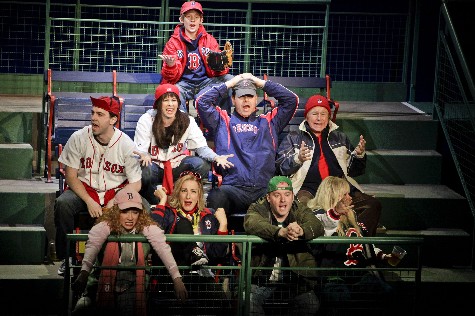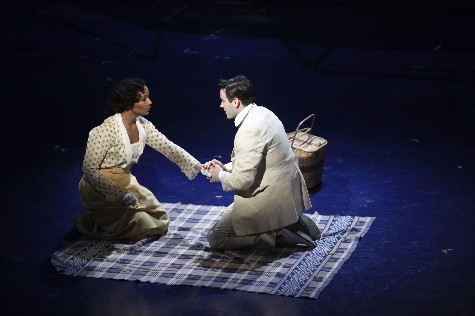Theater Review: The ART’s Musical “Johnny Baseball” — Safe at Home
Perhaps the inspirational cliches, by-the-numbers storyline, and fan cartoon hijinks are what’s expected in a baseball musical.

The Red Sox fans singeth in Johnny Baseball at the American Repertory Theater. Photo: Marcus Stern
Johnny Baseball, Music by Robert Reale, Lyrics by Willie Reale, Book by Richard Dresser. Story by Dresser and Reale. Directed by Diane Paulus. Staged by the American Repertory Theater at the Loeb Drama Center, Cambridge, MA, through July 11.
Reviewed by Bill Marx
Over the decades the stage productions at the American Repertory Theater have been a lot of things—crass, captivating, cantankerous, curious. But this is the first time a show from the edgy troupe has been corny, or, given Johnny Baseball’s raison d’être, the “curse” on the Boston Red Sox, out-and-out cornball. Perhaps the inspirational cliches, by-the-numbers storyline, and cartoon fan hijinks are what’s expected in a baseball musical.
On that score, the show’s creators, Richard Dresser, Robert Reale, and Willie Reale deliver the goods, marking off the checklist: a boy-gets-girl then inexplicably loses girl scenario; safe, social message about integration; salt-of-the-earth bleecherites waxing colorfully about their team (the ritzy folk in the expensive sky boxes don’t count); “Field of Dreams” inspired historical pains and pleasures; and hymns to the glories of “everybody’s game.” The result is Broadway-ized pleasant but wan entertainment—Johnny Baseball is conventional to the point of anemia.
The show’s set up is a bit schizophrenic. A collection of Red Sox fans sit in the stands in the late innings of the legendary 2004 American League Championship Series against the New York Yankees. The Red Sox are behind, and the faithful are sardonically bemoaning the club’s customary sad fate, begging for one more run.
As the game progresses, leading up to David “Big Papi” Ortiz’s game-winning homer, an elderly African-American pulls a ball-crazed kid named Robby aside and proceeds to tell him the real story behind the Red Sox curse: it wasn’t that Babe Ruth was sold to the New York Yankees. No, you have to go back to the troubled career of the talented white pitcher Johnny O’Brien, who joined the Yankees in 1920.
O’Brien hangs out with the tough-talking Babe, who takes him to a bordello where the rookie meets and falls in love with the African-American singer Daisy Wyatt, who, we are assured, is only an entertainer at the joint. (A scene I wish was in the show: somebody explains to Robby what a whorehouse is.) Interracial relationships were loathed in those days, and the Red Sox owner finds a way to get Daisy a gig singing in New York, which breaks up the couple. Things go awry, and, as will ever be in the world of Broadway, no letters or phone calls are exchanged to clear up misunderstandings. The pair drift apart. But there is a tie that will bring them together again . . . in a tear-wrenching way that explains the curse.
Thus Johnny Baseball jumps from amusing, populist songs about the lives and loves of the fans at the game, their marriages and well being intimately connected to the varying fortunes of the Red Sox, to the idealized romance between Johnny and Daisy, which, unfortunately, is more postulated than passionate. The relationship has all the erotic zing of a public service announcement, perhaps so we see Johnny and Daisy as ‘nice’ people.
Most of the rough-and-tumble language and behavior of the period is squeezed into the (standard?) portrait of Babe Ruth as a self-admiring boy-man. The homogenized doings undercut the show’s call for pathos, the overly predictable wind-up leading to a sputtering and somewhat forced inspirational pitch.

Colin Donnell (Johnny O’Brien) and Stephanie Umoh (Daisy Wyatt) picnic in Johnny Baseball. Photo: Marcus Stern.
The general blandness of the story invades just about every aspect of the production. The score is likable, but too softball to be memorable. As Daisy, Stephanie Umoh has a fine voice, but she isn’t given much of a chance to strut her vocal stuff. Why not have her sing, in the style of the time, a gritty jazz song that would send customers to their feet in a 1920s brothel in Boston? Johnny Baseball moves from the 1920s and the 1940s to the present, but the music sounds depressingly the same in each era, a comfortable showbiz recreation, via generic Americana conveyor belt, of jazz, blues, ballads, and anthems.
The American Repertory Theater cast members are energetic and enjoyable, perking up the proceedings when they play the Bostonian caricatures in the stands. These roles give the performers a chance to poke fun at themselves as well as their characters: the ‘truth’ behind the curse, because it is didactic than dramatic, is handled with deadening, earnest gloves. Thus while Colin Donnell is serviceable as the naïve-to-the-max Johnny O’Brien, Burke Moses, Jeff Brooks, Robert McClure, Joe Cassidy, Carly Jibson, Kirsten Wyatt, Kaitlyn Davidson, and Paula Leggett Chase have delicious moments of broad comedy as the long-suffering fans, begging for “one more run.”
Diane Paulus directs this world premiere production with athletic efficiency, moving the pieces of Scott Pask’s minimal, modular set about with aplomb, at times providing some clever staging touches. The chops that helped win a Tony Award for the recent revival of Hair are evident. Yet Broadway is about meticulously meeting stock expectations. It is depressing to see, at a time when SpeakEasy Stage Company and other local troupes are tackling funky, experimental musicals, that the ART thinks it will score with hometown audiences by playing it so determinedly safe.
Bill Marx is the editor-in-chief of The Arts Fuse. For over three decades, he has written about arts and culture for print, broadcast, and online. He has regularly reviewed theater for National Public Radio Station WBUR and The Boston Globe. He created and edited WBUR Online Arts, a cultural webzine that in 2004 won an Online Journalism Award for Specialty Journalism. In 2007 he created The Arts Fuse, an online magazine dedicated to covering arts and culture in Boston and throughout New England.
Tagged: American Repertory Theater, Boston Red Sox, Diane Paulus, Johnny Baseball, art, musical

